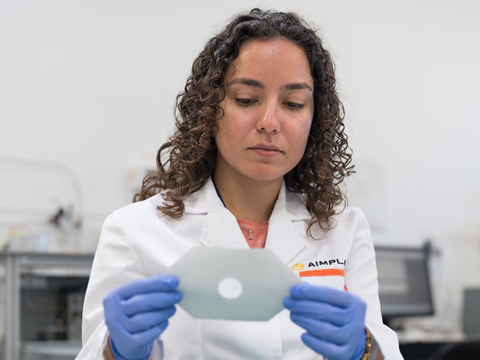
A project run by AIMPLAS, Potato Bioplastics, and Gaviplas is set to bolster the mechanical and barrier properties of flexible bioplastic packaging in the food, cosmetics, personal hygiene, detergent, and cleaning sectors.
Funded by the Valencian Institute of Competitiveness and Innovation (IVACE+i) through the European Union’s European Regional Development Fund (ERDF), the BIOPROCESS project aims to improve the protective qualities and extend the shelf life of biodegradable and/or compostable bioplastics – thus assisting in the phase-out of fossil-based, non-biodegradable plastics.
AIMPLAS has applied Machine Direction Orientation (MDO) extrusion technology to commercial bioplastics to manufacture flexible bioplastic films. It has also experimented with new formulations for natural polymers, examining their mechanical and barrier properties after processing via MDO and non-oriented sheet extrusion.
These polymers include polysaccharides, animal and plant proteins, and materials sourced from algae, gelatins, and corn or potato starch. Many are byproducts of other industries, which AIMPLAS hopes will add value to low-cost materials as raw materials for flexible packaging.
“In BIOPROCESS, we have adopted the one-step approach for producing films from natural polymers, as it offers significant advantages in terms of efficiency, sustainability, product quality, and preservation of the natural properties of the materials,” said Alicia Naderpour, packaging researcher at AIMPLAS.
“Additionally, the goal is to enhance the properties of bioplastics by orienting polymer chains for packaging applications without compromising their biodegradability and/or compostability.”
She adds that utilizing bioplastics in the packaging sector “is proposed as an alternative to conventional plastics in cases where food residues remain in the packaging, making recycling difficult. Therefore, using bioplastics in such applications allows for the organic recovery of packaging waste to produce high-quality compost.”
“The use of chemically unmodified natural polymers is gaining ground in these applications, as they are suitable for manufacturing packaging and plastic products that are banned under the SUP directive,” continued Rosa González, lead researcher of the Packaging Cluster at AIMPLAS.
“However, these materials must have the appropriate characteristics to be processed using conventional packaging manufacturing technologies, such as extrusion processing, and must also meet the necessary requirements to preserve the products they contain.”
The BIOPROCESS project falls under last year’s call for aid for technology centres in the Valencian Community, targeting R&D projects in collaboration with companies. This was promoted by IVACE+i and funded by the ERDF under the 2021–2027 Operational Program.
In a previous project, AIMPLAS sought to convert plant waste into packaging and adhesives via solvent-free mechanochemical techniques; this was hoped to keep harmful substances out of landfill and the natural environment while accelerating the adoption of biobased solutions.
Since then, it has unveiled a method for assessing the biodegradability of plastic materials ‘three times faster’ than conventional testing methods. It is anticipated to help companies make faster decisions when developing compostable materials.
AIMPLAS has also led the European BIOSUPPACK project, which has reportedly developed a compostable, renewable material from brewer’s spent grain that can replace conventional polyolefins. It can also be used to develop new thermoplastic materials and coatings for packaging in the food, cosmetics, and household cleaning sectors, the project consortium says.
Another development from the European ViSS project involves converting poultry waste and sugar byproducts into the biopolymer PHB with the aim of replacing fossil-based polymers in food packaging.
If you liked this story, you might also enjoy:
The ultimate guide to the Packaging and Packaging Waste Regulation in 2025
How are the top brands progressing on packaging sustainability?
Everything you need to know about global packaging sustainability regulation in 2025
The key to increasing the use of reusable packaging in supermarkets













No comments yet